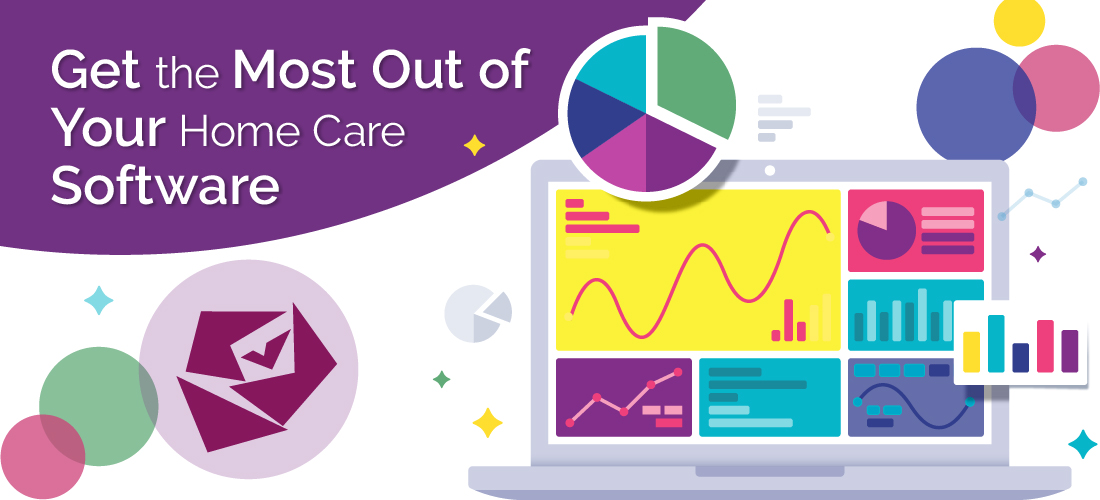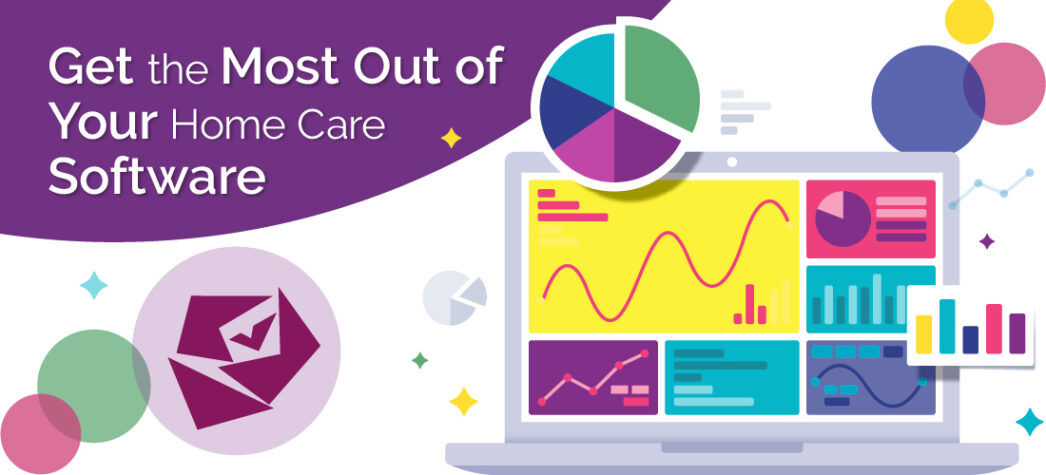
For an agency to be successful in the home care space, owners and operators should invest in home care management software. No matter which system an agency chooses, ensuring the business gets the most out of that software is important.
Whether it’s a brand new home care agency that’s shopping around for the best fit for their new business or an agency that’s been using the same system for years, there are often hidden gems that agencies don’t take full advantage of within a home care software.
When it comes to caregiver management software and the tools provided to help an agency run more efficiently and effectively, agencies should take advantage of the elements that will directly affect their business.
The Importance of Data Management
Agencies must be able to manage client and caregiver information clearly and effectively. To do that, they should be using straightforward, understandable software.
Home care management software should allow staff to access important information within a client or caregiver profile with relatively few clicks. Fewer clicks needed to get around the system will result in more efficient work and better productivity.
It’s also important to mention that agencies should collect valuable data for their business. Having a strategic conversation with your home care software vendor can go a long way in helping an agency determine which data is necessary for their business to make informed decisions.
Once you start collecting data, you can export it meaningfully with reports. Use this data to analyze your key performance indicators (KPIs) and utilize the information from your reports to improve your processes and enhance your operations.
Let’s Talk About Scheduling Tools
The most important tool for any home care agency is the ability to schedule caregiver shifts with an effective and adaptable software system.
Let’s be clear about something: scheduling is complicated.
The tools available for caregiver scheduling are not identical, but they’re all designed to do one very important thing: schedule caregiver shifts. Let’s dive into a few of them and what they can do to help your agency improve operations.
Leverage Skills Matching to Improve Quality of Care
The importance of a scheduler’s role at a home care agency cannot be understated. It requires the ability to put together a schedule of shifts based on various factors like caregiver availability, skills matching, and client preferences.
One of those important factors is Skills Matching. If you have a client who prefers female-only caregivers who don’t smoke and like pets, home care software can help the scheduler see which caregivers can work specific shifts for that particular client.
Letting your caregiver scheduling software do the work for you goes a long way in alleviating some of the burden on schedulers, who already have very difficult jobs.
Use Shift Offers to Help with Caregiver Retention
Owners and administrative staff are often challenged with providing caregivers in the field a sense of belonging to the agency even though they are seldom in the office.
In a world of caregiver shortage, using your software to its fullest capabilities can go a long way in helping create that sense of community with your agency.
Caregiver retention is a hot topic these days. So, how does your agency handle this challenge? We’ve heard from many of our agencies that giving employees an option to take or decline extra shifts is important to caregivers.
If your home care management software allows you to send out Shift Offers, your agency should use that tool. That being said, we strongly recommend agencies not overuse this tool. Otherwise, those shift offers can become noise, and caregiver engagement declines.
Make sure you use shift offers as an asset by using the tool correctly and selectively rather than sending every open shift out to every caregiver on staff.
Correct Electronic Visit Verification (EVV) Helps Agencies Run More Smoothly
Agencies need to focus on creating standardized processes for EVV that apply to all of their caregivers. Holding caregivers accountable for clocking in and out might feel uncomfortable, but it’s a must for operations to run efficiently.
Getting caregivers to fully embrace the EVV process and accept that it’s something valuable and important is one of the biggest challenges a home care agency has. EVV is not just about ensuring a caregiver is on-site at a client’s residence.
If a caregiver clocks in and out of a shift, that should feed directly into your billing and payroll system. That creates accountability and ensures the client gets the care they need. EVV is a fundamental component of making sure you bill your clients correctly and pay your caregivers correctly.
Agencies should help their caregivers understand that EVV tools, like a caregiver app, can be used for more than clocking in and out. The app should also allow them to receive and respond to Shift Offers, look at their schedules, and check care plan tasks for their clients.
A good caregiver app will give caregivers insights into when and where they work, who they’re working for, and what the expectations are when they are working. This gives caregivers a sense of control and an easy way to access these things rather than depending on paper forms and instructions that could be lost or damaged.
Customer Care Should be an Agency Priority
No one likes to wait in line – in person or on the phone. Your clients expect they can speak with you when they call your office. You should have the same expectations as your software provider.
Getting someone on the phone who can provide quality customer support when you have a problem is important. Support is a major part of helping effectively run an agency.
That being said, remember that troubleshooting complex issues is a team effort between the software and the agency. Some fixes are quick and easy, while others might take more time. It’s challenging but also helpful to be patient and provide as much information about your technical issue as possible so your support team can do their job and help resolve your problem as fast as possible.
Be Flexible
No software will solve every problem because each problem is unique to the agency dealing with it. A good software partner will solve about 75% of your needs, as it’s built to cover most business needs for as many agencies as possible.
With that in mind, remember that while the software would be somewhat flexible, your agency should also be. Your staff might have to change some processes to adapt to the software.
That’s not necessarily a bad thing. In fact, changing processes to fit your software often solves problems you might not have realized you had and could free up an enormous amount of time that can then be used to focus on other things, like recruitment, retention, and giving care.
Promote Software Ownership
Finally, an agency will only get the most out of its home care management software if it has experts on staff who are committed to learning the software properly. That person will study and learn the software, build relationships with the vendor’s customer care team, and be the “go-to” person at the agency who can answer questions others on staff might have.
It’s important to have a broad understanding of what’s available in your specific caregiver scheduling system. If you’re not using your software to its full capabilities, now is a great time to start.
Software should have the tools in place an agency can use to improve data management, schedule with ease, apply EVV, improve operational efficiency, and make everyone’s work life easier. If your software doesn’t do all these things, it might be time to ask, “Why not?”
 About David Goldwyn, Customer Care Manager
About David Goldwyn, Customer Care Manager
The Rosemark System
Guest blog for corecubed
With nearly 20 years in customer service and support roles, David loves to help customers find solutions to their problems. Partnering with our clients is what he loves most about the job. His experience and passion for helping others succeed foster an atmosphere that encourages learning and growth. Adept at leveraging existing skillsets, he takes pride in helping our partners establish great routines and problem-solve the toughest issues. No matter how complicated the issue might be, David likes nothing better than finding the answer.

